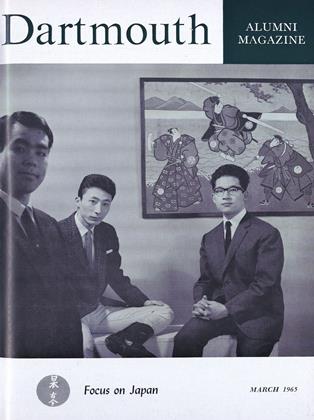NEW HAMPSHIRE this past month became another battleground in the grim tug-of-war between those who would grant legislative regulation of who can and cannot address audiences at public institutions and those who hold that all institutions of higher learning, public as well as private, should be unfettered by such restrictions to free inquiry. Many Dartmouth voices, including President John Sloan Dickey's, were heard in the chorus of academic protest to the "Feldman Bill" to ban Communists and other subversive speakers from the state's institutions.
Although Dartmouth undergraduates have been relatively quiet on the issue compared to vigorous student protesters at the state-supported schools directly affected, the Dartmouth faculty and President joined with counterparts at the University of New Hampshire and St. Anselm's College in strong statements in defense of academic freedom. American Association of University .Professors' chapters at the three institutions issued a joint condemnation of the proposed legislation, basing their stand mainly on the importance of academic freedom and faith in the ability of the University's Trustees to establish policy regarding speakers. The AAUP statement also warned that such legislation could set a precedent harmful to all higher education, public and private.
Two days before hearings on the bill were scheduled to begin, the Executive Committee of the Dartmouth faculty went on record as "vigorously opposing" the bill, and on the first day of hearings President Dickey personally journeyed to Concord to deliver before the House of Representatives' Education Committee a statement in opposition that has relevance far beyond the boundaries of New Hampshire. This statement is printed in its entirety on the next page.
In that same week a violent death and a federal court ruling, both in New York City, were related to Dartmouth's own student-sponsored "outside speakers" program. Less than three weeks before his assassination in Harlem, the controversial Malcolm X had stood before a standing-room-only crowd in Spaulding Auditorium as the guest of the Undergraduate Council —as had Moral Rearmament leader Peter Howard a month before and had preached and defended his militant "Black Revolution." The court ruling provided The Dartmouth's lead article the day after Malcolm X's demise had dominated the local news. The ruling prevented another UGC-scheduled speaker, Levi Laub of the Student Committee for Travel to Cuba, from keeping his campus date. The UGC's third speaker is under indictment for a violation of a State Department ban on travel to Cuba, and he can leave New York City only with the court's permission.
"For God's sake, let us hear both sides!" The Dartmouth trumpeted, using a Thomas Jefferson quotation to express annoyance at the court ruling, a ruling that will undoubtedly guarantee the UGC's newest personal representation of a current controversy a much larger audience when, and if, the court relents. For a privilege that Dartmouth undergraduates blithely take for granted, to the south of Hanover hundreds of their contemporaries were girding themselves for battle.
 View Full Issue
View Full Issue
More From This Issue
-
 Feature
FeatureTHE EDUCATION LADDER
March 1965 By PROF. BURTON E. MARTIN '33 -
 Feature
FeatureFocus on
March 1965 -
 Feature
FeatureAlumni in Japan
March 1965 -
 Feature
FeatureHonorable President in Japan
March 1965 -
 Class Notes
Class Notes1930
March 1965 By WALLACE BLAKEY, HARRISON F. CONDON JR. -
 Class Notes
Class Notes1920
March 1965 By GEORGE H. MACOMBER, ALBERT W. FREY
Article
-
 Article
ArticleGIFT TO FOOTBALL TEAM
August, 1915 -
 Article
ArticleFORMER PASTORS OF COLLEGE CHURCH ACTIVE
March 1920 -
 Article
ArticleMasthead
September 1978 -
 Article
ArticleSoutheastern Connecticut
October 1973 By ALBERT E. WINKLER JR. '44 -
 Article
ArticleSOUTHERN CALIFORNIA ASSOCIATION
January, 1925 By C. G. Milham -
 Article
ArticleSpeeded Reading
January 1942 By ROBERT M. BEAR asst.

